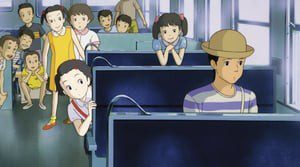Review of Only Yesterday, Directed by Isao Takahata
If you saw Star Wars: The Force Awakens—and who hasn’t?—and were impressed by the young actress who played Rey, Daisy Ridley—and who wasn’t?—then you might be interested in her latest film. No, it’s not Episode VIII of Star Wars, which has just started production. Instead, it’s Only Yesterday, a 1991 film from Japan’s Studio Ghibli, just now receiving a 25th anniversary release in North America.
The English-dubbed version of Only Yesterday features the voices of Ridley as Taeko, a 27-year-old woman traveling from her home in Tokyo to the countryside to assist a family with its harvest, and Dev Patel (Slumdog Millionaire) as Toshio, a farmer whose agrarian lifestyle appeals to Taeko.
The year is 1982, but as Taeko travels from the city to the country, she can’t stop thinking about a pivotal time and place in her life: 1966 Tokyo, when she was in the fifth grade. Although the Beatles had taken Japan by storm, Taeko’s memories aren’t of the music of that era so much as they are of her schooling. “Like a movie playing inside my head,” Taeko can’t stop the flood of remembrances. But as the past intrudes, the present is never far from Taeko’s mind. “Perhaps,” she thinks, her fifth-grade self is “telling her to find a new way to fly.”
We know that something is missing from Taeko’s life in the present, but that absence is slow to reveal itself. Does the gauzy look of the frame when she flashes back to earlier simply serve to key viewers to the change in time frame, or is Taeko idealizing her past? Maybe it’s the simple things of Taeko’s life—such as a brief giving of thanks before partaking of pineapple—that have been crowded out by adult responsibilities.
The uncertainty about what Taeko is lacking in her adult life—she has a good job at a good company—don’t seem to plague her new friend Toshio. He’s a farmer, and although he recognizes that he’s part of a dying industry, he doesn’t seem panicked or morose about his work. But he knows enough to realize that “city ways” don’t provide a better option.

That could be the set-up for a man vs. nature tale in which, predictably, man is the villain. But one of the strengths of Only Yesterday is that it doesn’t idealize nature at the expense of contemporary life. While it would be easy to characterize Taeko’s city work as soul-draining and Toshio’s natural farming as threatened by man’s modern ways, the screenplay instead allows Toshio to describe how nature and manmade innovation have worked together in Japan to provide for mankind while preserving, and even strengthening, the beauty of the land. Toshio calls such work a “joint venture”—a much more nuanced portrait of the nature/civilization clashes we see in so many Western films.
Only Yesterday also has something to say about parental wisdom and authority—no longer fashionable subjects, if they ever were. Taeko’s father is portrayed as a stern authoritarian who cannot be reasoned with. He slaps Taeko in one scene. But what might have been his cruelest gesture—denying Taeko a chance to pursue her dream of being an actress after she shows early talent—is revealed to be an act of wisdom when Taeko’s exhibition of acting skill turns out to be a one-time event rather than an ongoing talent.
If the plot sounds like a recipe for a wistful, melancholy film, it is, but it’s one that should hold appeal for certain audiences. While Only Yesterday doesn’t cater to young viewers, patient children will find it rewarding. Adult viewers are even more likely to be moved by Only Yesterday, which leaves us considering the tradeoffs we make in pursuing our vocations and other callings. Did we make the right decision years ago, the one that set us on the path we’re on? Is there a place for regrets? And how important is human companionship along the way?
Directed by Studio Ghibli co-founder Isao Takahata, Only Yesterday is nostalgic but not overly sentimental, and its conclusion feels happy without coming across as cheap. It’s a delicate film, paced for audiences who aren’t eager for action or big laughs. Instead, it has a reflective quality that leaves a warm feeling that extends through the final credits, until the screen goes dark.










